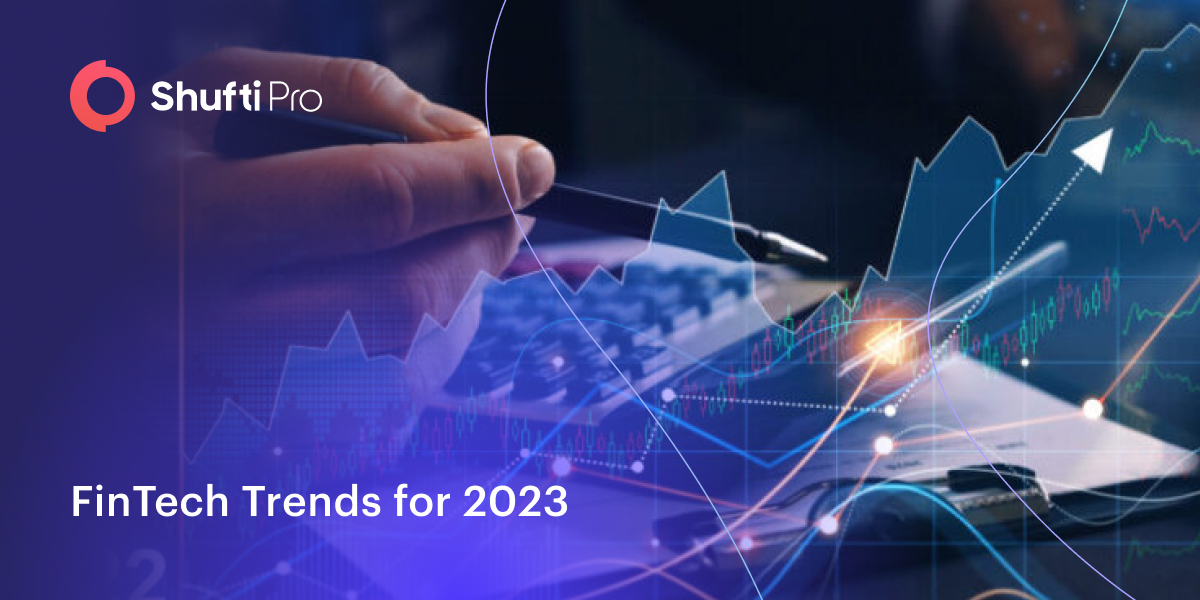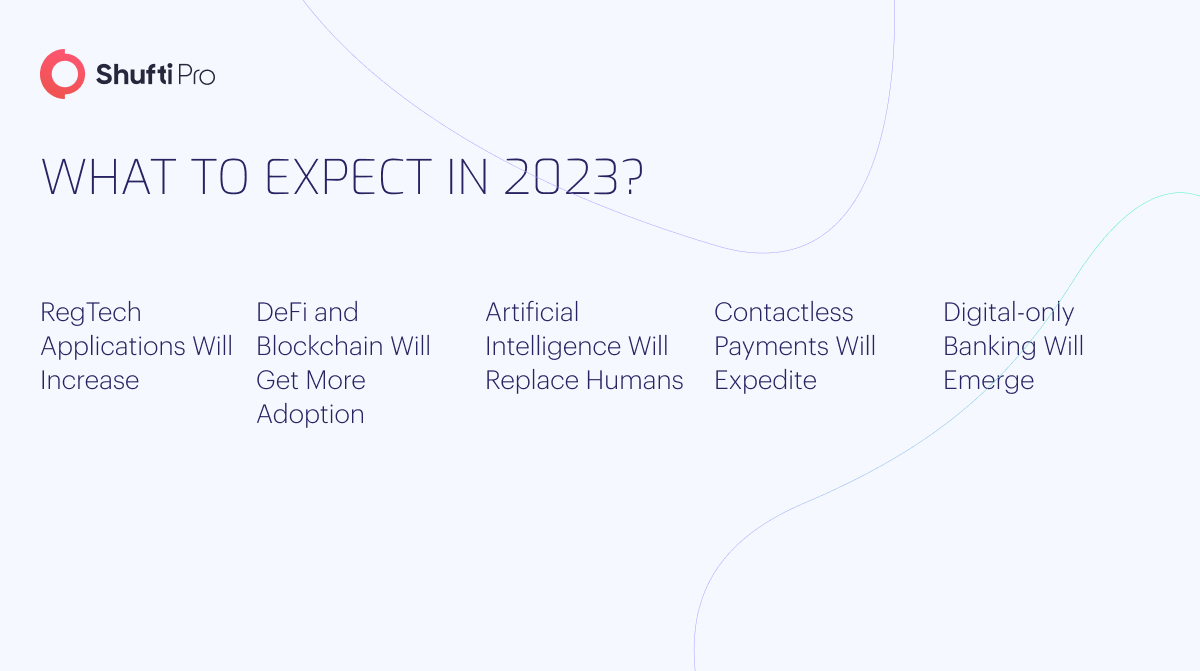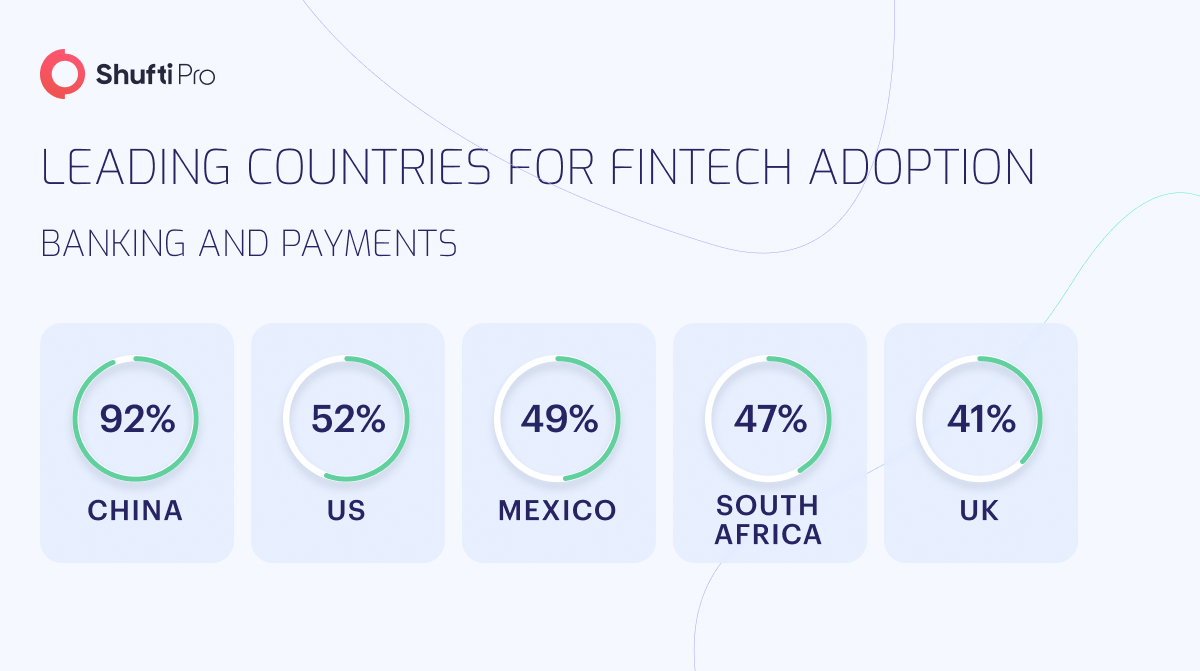Top 5 FinTech Trends to Keep an Eye on in 2023

From the lingering effects of the COVID-19 pandemic to the sudden cryptocurrency market crash, 2022 was a challenging year for consumers and businesses on a variety of fronts. Companies worldwide had to continuously assess their business models in order to adapt to the market shifts, which proved to be quite the challenge.
Fintech was one of the sectors that has had to adapt to the rapidly changing global environment. Trends in Fintech are constantly emerging and changing to satisfy global regulatory requirements and meet customer demands. And there are more powerful technological advancements on the horizon that will continue to shake things up in 2023, allowing fintech companies to further improve client experiences, reinforce business propositions, and increase revenue.
In this article, we’ll look at the top 5 emerging Fintech industry trends that should be on your radar and what they mean for your business.
What is FinTech?
Fintech is short term for “financial technology”. It refers to innovations in technology that seeks to maximize the impact of software, services and products specifically within the financial sector through specialised software solutions. Companies in this field leverage the latest innovations to automate and improve their operations and client offerings.
In simpler terms, fintech solution providers benefit both customers and businesses in numerous ways. From mobile banking to cryptocurrency and investment applications, companies in this field offer a wide range of applications and solutions to improve the quality and efficiency of service whilst staying compliant by sticking to the Fintech KYC solution.
What Does 2023 Hold for the FinTech Sector?
The new year has plenty of more changes in store for fintech companies that will streamline their financial processes and change the way they operate as businesses. Fortunately, advancements in technology and big data allow us to take a look ahead in order to prepare our enterprises better for what is to come. Let’s look at the top five trends in Fintech for 2023 as predicted by experts.

1. Increase in RegTech Applications
Regulatory technology, more commonly known as RegTech, recently gained recognition as a cornerstone of the Fintech emerging markets. But what exactly is RegTech? Where did it come from? What is its significance in terms of business impact?
As the name implies, regulatory technology is a fintech subgroup that employs technology to oversee regulatory procedures such as tracking, reporting and compliance. The name was first coined in 2008, however, the RegTech field has recently overseen a tremendous expansion, with no signs of stopping its climb up the growth ladder.
As more and more services become digital, they face more and more risks in their line of operation. Fintech solution companies are a haven for fraud, hacking, data breaches and other possible threats that can be detrimental to businesses and their customers. As a result, regulatory technology will continue to rise in popularity and usage to prevent such adversity in the financial field. This is further witnessed by the upward trend experts are observing with emerging RegTech solutions. According to a report by Custom Market Insights, the market share is anticipated to elevate to a staggering $44 billion by 2030 compared to $8.2 billion in 2021.
2. Rise of DeFi and Blockchain Technologies
Moving on to the other trends in Fintech, let’s start with the fact that the cryptocurrency market suffered major hits in the last 12 months, losing almost $2 trillion since its peak last year. However, this crash does not necessarily mean crypto’s ultimate demise.
Actually, the general state of the economy appears to be more to blame for the downward trend than any other factor. As a matter of fact, the underlying blockchain technology continues to advance and show promise in a variety of real-world applications, which will certainly drive up the value as more and more people will begin to understand its logic and use. A recent study by the Stellar Development Foundation (SDF) shows that the value of crypto for international payments is becoming widely recognised.
One of the issues that the blockchain and decentralised finance (DeFi) are trying to address is the expensive, cumbersome and slow process of international monetary transactions. DeFi aims to make these peer-to-peer transactions instant and free.
To drive the point home further that crypto is here to stay, let’s take a look at the new partnership between Google and prominent cryptocurrency company Coinbase. Along with sharing tools and infrastructure, the tech giant will also accept cryptocurrency as a valid form of payment. We anticipate that more companies will follow in Google’s footsteps, further integrating blockchain and DeFi into the overall global economy.
If you’d like to learn more about what the upcoming year has in store for the blockchain market, read our article on the top 5 cryptocurrency trends in 2023.
3. Boost of AI Automation
The use of artificial intelligence is expanding worldwide, with the rise of the popularity in AI tools such as OpenAI’s ChatGPT. AI automation can be implemented in almost any industry, including the financial technology trends, which is ready to benefit from everything that these new innovations have to offer. According to an analysis by Mordor Intelligence, the influence of artificial intelligence for trends in Fintech will grow by 25% over the next five years.
But how exactly will Fintech solution companies reap the rewards of automation in 2023? Let’s take a look at the two primary benefits that AI will bring to the industry:
AI Decision-making
Decision-making is an important aspect in every field, however, it is extremely significant in the finance and banking sector. The process requires a lot of time, attention to detail and, most importantly, labour.
However, businesses are struggling to accomplish all of that while also maintaining their competitiveness and lowering operating expenses. As a response to this, algorithmic AI-fueled decision-making is one of the FinTech solution development to gain traction in recent times. But how is it beneficial?
To begin with, artificial intelligence constantly evaluates current facts and renders quick conclusions based on available data. This action significantly reduces the time and energy required for traditional decision-making solutions. Finance professionals are now able to optimise their work, stay on top of their competitors in the market and focus on providing the best quality solutions they can.
One of the ways AI is leveling the tedious decision-making field is by offering secure, automated verification solutions that rapidly reduce the processing time. If you’d like to learn more about how we at Shufti are pioneering this practice, read about our five-year track record of accelerating digital trust worldwide.
Conversational AI
AI can help Fintech solution providers in more ways than just making split-second decisions. It can also help enterprises minimize monetary crimes by implementing Fintech AML solution to improve customer satisfaction and thus, increase retention rates.
Well, financial institutions deal with numerous frequently asked questions from a plethora of customers on a daily basis. Normally, their clients would be put on hold and wait for an operator to connect. This brings up two key problems:
1. Banks must hire a significant number of operators.
2. The slow response times negatively affect consumer satisfaction.
So, how can artificial intelligence help in such cases? Through the use of self-operating chatbots, trained to address specific customer pain points. Machine learning engineers would train these models on either pre-existing data or feed them bank-specific information, then deploy the bots to the public, where they will continue to learn and optimise their answers. Because they are autonomous, their response time is instantaneous and clients don’t have to wait for hours in line. This further increases the processing time and satisfaction levels with the bank’s service. For this reason, these AI solutions are gradually turning into invaluable resources for customer service departments across the board.

4. Expedited Contactless Payments
As a quarantine security precaution, contactless payments have gained popularity. However, customers are now aware of how quickly, easily, and conveniently they make purchases.
And Fintech solutions have long included contactless payments, however, it wasn’t until the COVID-19 outbreak that this service truly took off. According to a survey conducted by Cantaloupe in partnership with the Broad College of Business at Michigan State University, the number of cashless transactions increased by 11% from 2020 to 2021.
This trend is forecasted to continue to rise. According to a Juniper Research report from 2021, the volume will increase by 92% globally by 2023. Therefore, we can safely conclude that contactless payments will be a prominent trend during the year ahead.
5. Emergence of Digital-only Banking
Digital banks are one of the fastest-growing trends in Fintech, almost completely replacing traditional banking. This comes as no surprise as their popularity is fueled by convenience.
In that sense, digital banking is redefining ease for customers across the board. Filling out paperwork is easier than ever as customers don’t have to waste any time going to a local branch or standing in line to speak to a representative – it is all done digitally.
However, that is merely the tip of the iceberg. In addition to their accessible offerings, digital-first banks like Revolut provide a number of other benefits to their clients such as instant cross-border transactions, minimal fees, immediate peer-to-peer transfers and even investment options.
The shift toward digital finances is only just beginning – Finder reports that, as of 2020, 1.9 billion people were using online banking services with a forecasted rise to 2.5 billion by 2024.
How to Prepare for FinTech Industry Trends 2023?
2023 is shaping up to be an exciting year for Fintech solutions advancements. Some market drivers, such as AI, have already been anticipated by the general public. However, others like DeFi have lately had significant growth yet may be more challenging to adapt to as they’re only just now entering the playing field.
What can you do to futureproof your business, then? Just make sure to stay on top of the forecasts and satisfy market demands. For example, if your focus is mainly on trading, ensure that your employees have a greater knowledge of blockchain development. Meanwhile, AI experts can help support data management, educate about the rapidly changing field of automation, and enhance customer service for consumer-finance-related services.
Trends in FinTech 2023: Key Takeaways
It’s difficult to predict how the coming year will turn out – even analysts can’t say what will happen for certain. However, 2023 is shaping up as another big year for the financial sector, with lots of new regulations, market trends, and technological transformation on the horizon.
Keep in mind that trends in Fintech may still have a significant impact on organisations outside of the finance and banking field. With the increasing adoption of financial technology, issues such as identity fraud and money laundering will continue to be a challenge for businesses from all industries.
Shufti is an effective solution that strives to accelerate trust between businesses and customers worldwide. A fully automated product line, such as the Fintech KYC solution and AML Screening tool, provides powerful background checks against 1700+ global watchlists and is designed to work with a variety of global regulations. Learn more by connecting with an AML expert below.

 Explore Now
Explore Now













